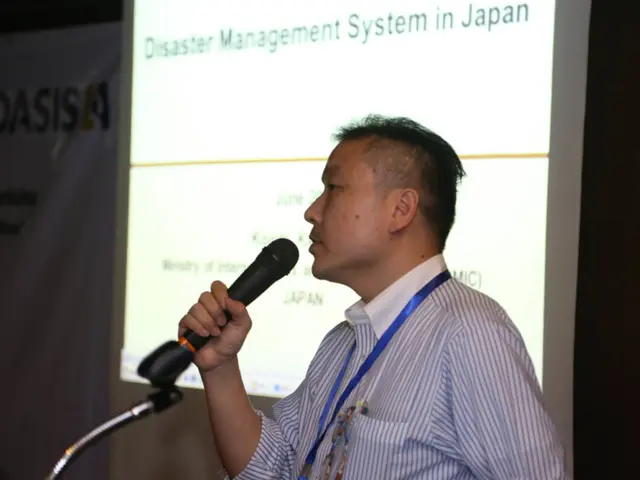Cross-border payment service trial begins in Ghana, initiated by Onafriq and PAPSS.
In a groundbreaking move, Onafriq and the Pan-African Payment and Settlement System (PAPSS) have launched a new cross-border payment service in Ghana, marking the operational debut of their 2022 partnership [1][2][3]. This innovative service aims to simplify outbound transactions from Ghana to other African countries, offering fast, secure, and cost-effective transfers directly into mobile money wallets and bank accounts across the continent [1][2][3].
The service is designed to improve financial interoperability, particularly for small and medium-sized enterprises (SMEs) and individuals, by reducing transaction costs and simplifying currency exchanges [1][2][3]. It leverages PAPSS’s centralized platform, which allows transactions in local African currencies like the Ghanaian cedi, avoiding reliance on expensive foreign currencies such as the US dollar [1]. This local currency settlement can reduce fees from as high as 10–30% down to about 1%, potentially saving Africa billions annually [1].
The pilot phase, approved by the Bank of Ghana, involves banks, licensed fintechs, mobile money providers, and traditional financial partners who can now enable real-time cross-border payments [3]. PAPSS, created by the African Union and African Export-Import Bank (Afreximbank), under the African Continental Free Trade Area (AfCFTA) framework, serves as the settlement authority, ensuring trusted, timely, and secure transactions [2][3].
A crucial feature of the service is its direct integration with mobile money wallets, enabling instant transfers across borders, which supports both commercial growth and personal financial connections [1][3]. Onafriq is expanding this integration to encompass various mobile money operators and fintech partners, ensuring the service’s broad accessibility and ease of use across Africa [1].
Dare Okoudjou, Founder and CEO of Onafriq, stated that the service is not just about convenience, but also enhances economic activity between Ghana and the region. Mike Ogbalu III, CEO of PAPSS, added that the partnership represents a commitment to empowering SMEs and individuals by simplifying cross-border transactions [3].
By lowering transaction costs and increasing transaction speed and transparency, the service aims to boost intra-African trade, financial inclusion, and formalization of informal cross-border commerce, especially benefiting SMEs and retail customers [2][3]. The partnership hopes to diminish the significance of national borders in financial transactions within Africa, strengthening economic and social ties across countries [3].
This pilot in Ghana represents an important step toward scaling the service continent-wide, fostering a more unified and inclusive African financial ecosystem [1][3]. The service will soon expand to more African markets and be integrated with mobile money and other fintech wallets, making cross-border transactions easier and more affordable for millions of Africans.
[1] Onafriq. (2025). Onafriq and PAPSS Launch Cross-Border Payment Service in Ghana. Retrieved from https://www.onafriq.com/news/onafriq-and-papss-launch-cross-border-payment-service-in-ghana [2] African Export-Import Bank. (2025). Onafriq and PAPSS Launch Cross-Border Payment Service in Ghana. Retrieved from https://www.afreximbank.com/news/onafriq-and-papss-launch-cross-border-payment-service-ghana [3] Bank of Ghana. (2025). Onafriq and PAPSS Launch Cross-Border Payment Service in Ghana. Retrieved from https://www.bankofghana.org/news/onafriq-and-papss-launch-cross-border-payment-service-ghana
The new cross-border payment service, launched by Onafriq and PAPSS in Ghana, aims to improve financial interoperability, particularly for SMEs and individuals, through leveraging technology to reduce transaction costs and simplify currency exchanges in local African currencies. This initiative, with its direct integration with mobile money wallets, also targets boosting business activities and personal financial connections across the continent.




